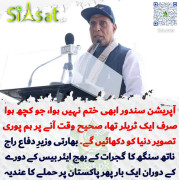RiazHaq
Senator (1k+ posts)
Improved Water and Sanitation: Among the most populated countries in the world, Pakistan, China, and Nigeria were top performers (ranked 5, 11, and 18 respectively). Conversely, Russia, the Philippines and India were bottom performers (ranked 72, 83, and 92 respectively).
The WaSH Performance Index is the sum of country performance values in the following components: water access, water equity, sanitation access, and sanitation equity. Each of the components ranges from -1 to 1 meaning the overall WaSH index value can range from -4 to 4.Figure 19 summarizes the values. The WaSH Performance Index was calculated for 117 countries (i.e. 117 countries had values for all four index components). Tables 6 and 7 list the countries with the top ten and bottom ten values. Values range from -1.34 to 2.6, which is much smaller than the range of possible values (-4 to 4).

Figure 19. WaSH Performance Index values by country
Top and bottom performing countries
The top ten and bottom ten countries are a surprising group. Low levels of coverage are often clustered in certain regions – for example, water access is low in sub-Saharan Africa while sanitation access is low in South and Southeast Asia. In contrast, performance values appear to be spread widely within regions. This suggests that country-specific factors, such as the enabling environment, may be driving performance and regions as a whole are not constrained to perform poorly.
Among countries with top ten values, two are low income, five are lower middle income and three are upper middle income. Among countries with bottom ten values, three are low income, five are lower middle income, and two are upper middle income. Top performing countries are located in all world regions with the most from South Asia (n = 4) and Sub-Saharan Africa (n = 2). Among bottom ten countries, three are from East Asia and the Pacific, and four are from Sub-Saharan Africa. A few countries are under-represented in the JMP data sets that we used, notably highly industrialized countries with very high coverage rates (as data may not be collected) and small island developing nations (as few have nationally representative household surveys).
Table 6. Top ten countries in the 2015 WaSH Performance Index

Table 7. Bottom ten countries in the 2015 WaSH Performance Index

Among the most populated countries in the world, Pakistan, China, and Nigeria were top performers (ranked 5, 11, and 18 respectively). Russia, the Philippines and India were bottom performers (ranked 72, 83, and 92 respectively).
Trends in performance
Tables 8 and 9 show the trend of components for the top ten and bottom ten countries. Six of the top ten have improving trends over time for all components. Conversely, seven of the bottom ten have an unchanged or deteriorating trend for all components. Tables 6 through 9 show that among most top performing countries, neither water nor sanitation components dominated the overall Index value, suggesting improvements in water and sanitation do not necessarily come at the expense of the other.
Table 8. Trend in performance among the top ten countries

Table 9. Trend in performance among the bottom ten countries

http://waterinstitute.unc.edu/wash-performance-index-report/
- The WaSH Performance Index is the sum of country performance values in the following components: water access, water equity, sanitation access, and sanitation equity.
- Among most top performing countries, neither water nor sanitation dominated the overall Index value, suggesting improvements in water and sanitation do not necessarily come at the expense of the other.
- Among the most populated countries in the world, Pakistan, China, and Nigeria were top performers (ranked 5, 11, and 18 respectively). Conversely, Russia, the Philippines and India were bottom performers (ranked 72, 83, and 92 respectively).
The WaSH Performance Index is the sum of country performance values in the following components: water access, water equity, sanitation access, and sanitation equity. Each of the components ranges from -1 to 1 meaning the overall WaSH index value can range from -4 to 4.Figure 19 summarizes the values. The WaSH Performance Index was calculated for 117 countries (i.e. 117 countries had values for all four index components). Tables 6 and 7 list the countries with the top ten and bottom ten values. Values range from -1.34 to 2.6, which is much smaller than the range of possible values (-4 to 4).

Figure 19. WaSH Performance Index values by country
Top and bottom performing countries
The top ten and bottom ten countries are a surprising group. Low levels of coverage are often clustered in certain regions – for example, water access is low in sub-Saharan Africa while sanitation access is low in South and Southeast Asia. In contrast, performance values appear to be spread widely within regions. This suggests that country-specific factors, such as the enabling environment, may be driving performance and regions as a whole are not constrained to perform poorly.
Among countries with top ten values, two are low income, five are lower middle income and three are upper middle income. Among countries with bottom ten values, three are low income, five are lower middle income, and two are upper middle income. Top performing countries are located in all world regions with the most from South Asia (n = 4) and Sub-Saharan Africa (n = 2). Among bottom ten countries, three are from East Asia and the Pacific, and four are from Sub-Saharan Africa. A few countries are under-represented in the JMP data sets that we used, notably highly industrialized countries with very high coverage rates (as data may not be collected) and small island developing nations (as few have nationally representative household surveys).
Table 6. Top ten countries in the 2015 WaSH Performance Index

Table 7. Bottom ten countries in the 2015 WaSH Performance Index

Among the most populated countries in the world, Pakistan, China, and Nigeria were top performers (ranked 5, 11, and 18 respectively). Russia, the Philippines and India were bottom performers (ranked 72, 83, and 92 respectively).
Trends in performance
Tables 8 and 9 show the trend of components for the top ten and bottom ten countries. Six of the top ten have improving trends over time for all components. Conversely, seven of the bottom ten have an unchanged or deteriorating trend for all components. Tables 6 through 9 show that among most top performing countries, neither water nor sanitation components dominated the overall Index value, suggesting improvements in water and sanitation do not necessarily come at the expense of the other.
Table 8. Trend in performance among the top ten countries

Table 9. Trend in performance among the bottom ten countries

http://waterinstitute.unc.edu/wash-performance-index-report/
Last edited:




























